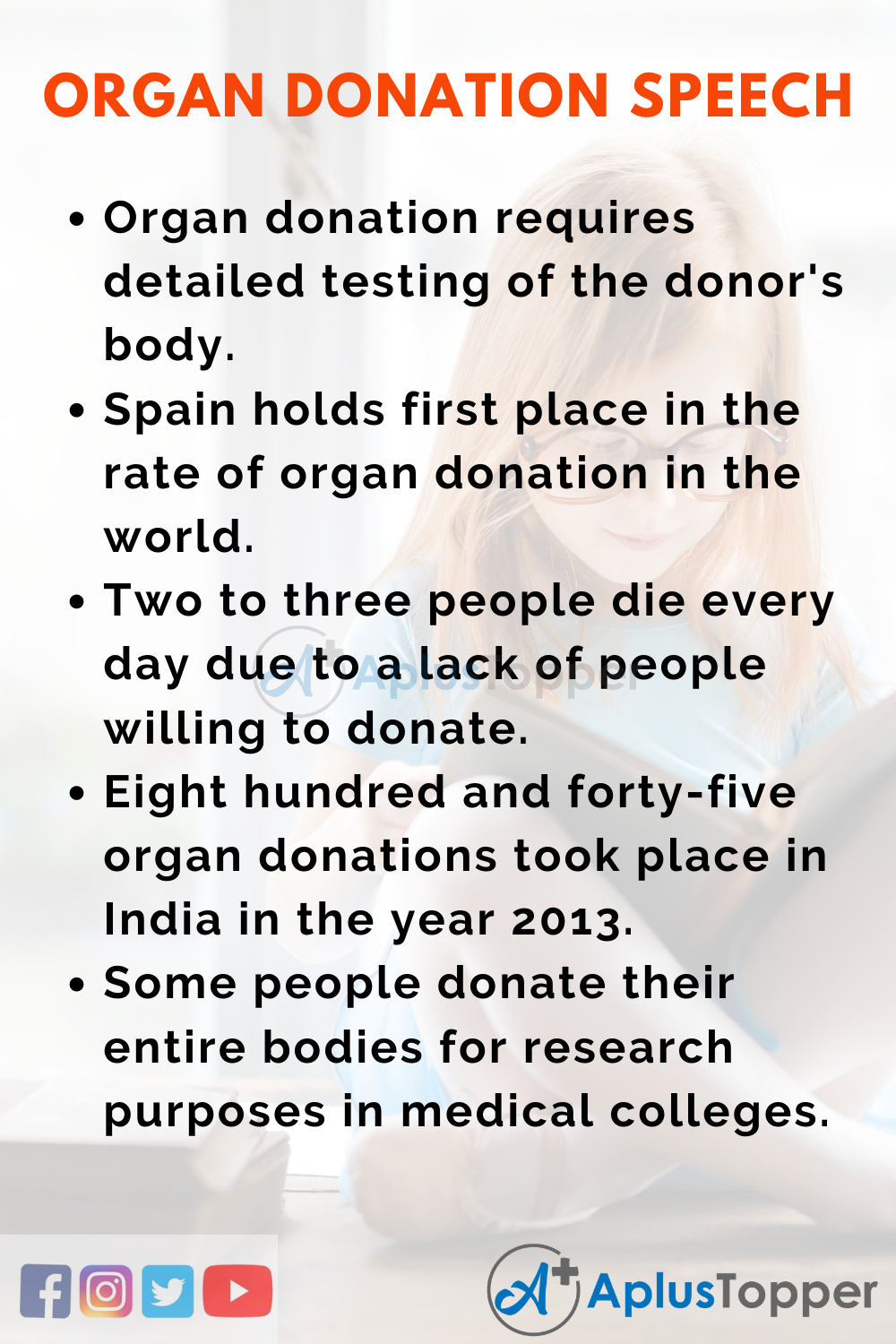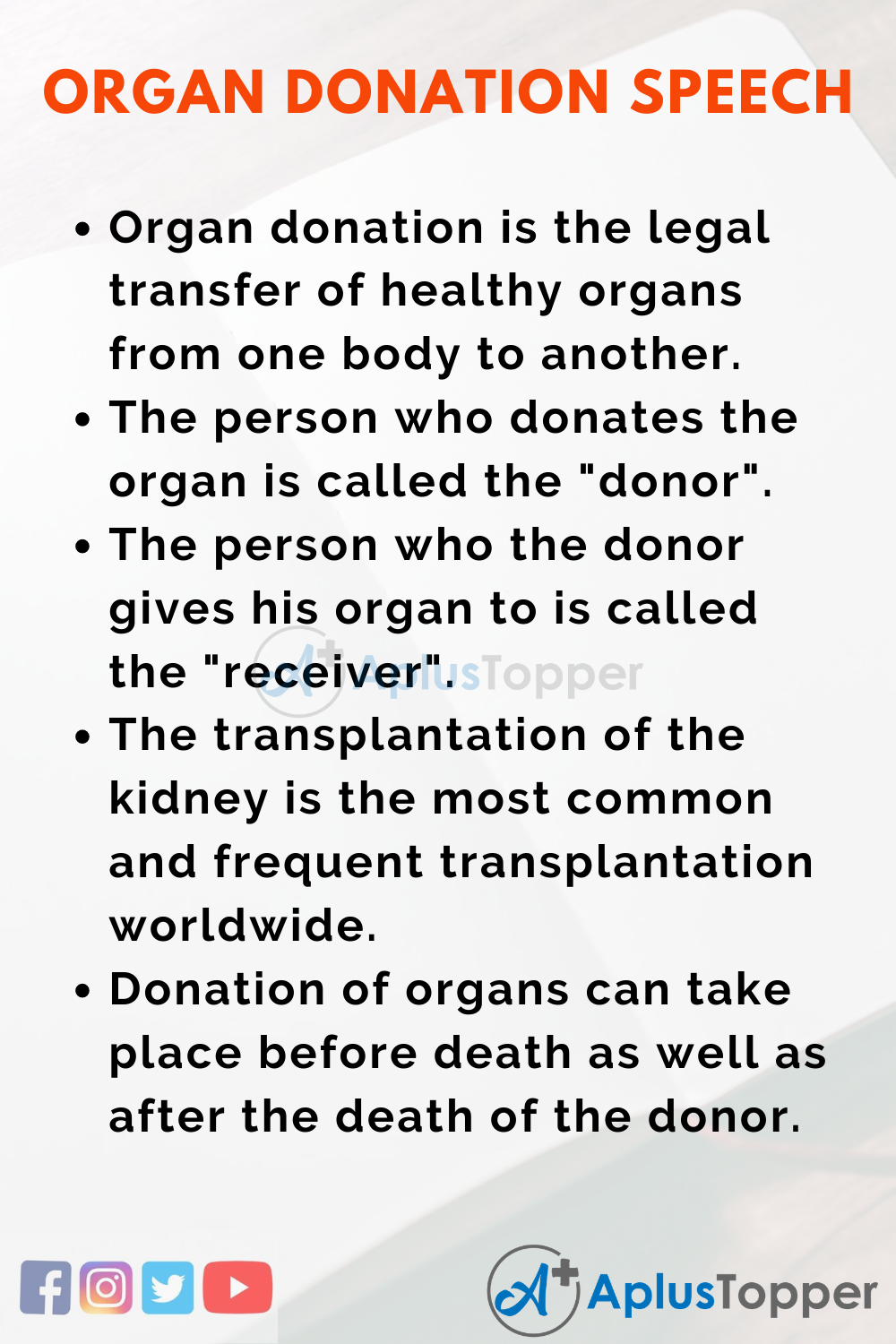Speech On Organ Donation: Organ donation is the process in which healthy organs and tissue of a person are taken for transplantation into another person. It is a legal process. The consent is taken from the donor while he is alive or with the permission of the next kin if the donor is dead.
Organ donation may be for research purposes or to save another person’s life who is in need of it. With the up-gradation of science, technology and medical science, the rate of organ donation has increased significantly.
Students can also find more English Speech Writing about Welcome Speeches, Farewell Speeches, etc
Long And Short Speeches On Organ Donation for Kids And Students in English
We are providing a long Speech On Organ Donation of 500 words and a Short Speech On Organ Donation of 150 words along with ten lines on the same topic for the readers.
These given speeches will be useful for students who might be requested to deliver a speech regarding the donation of organs.
A Long Speech On Organ Donation is helpful to students of classes 7, 8, 9, 10, 11 and 12. A Short Speech on Organ Donation is helpful to students of classes 1, 2, 3, 4, 5 and 6.
Long Speech On Organ Donation 500 Words In English
Good morning, to our honourable Principal, respected teachers and my friends.
I am (your name), and I have been given the opportunity to deliver a speech on organ donation.
Organ donation is a social act that is looked upon with honour. India follows the opt-in system for organ donation. The Transplantation of Human Organs Act 1994 controls the organ donation in India. India’s Ministry of Health and Family Welfare Government website gives out legal forms for those wishing to donate an organ.
Organs are the vital tissues that make our entire body function, and when a particular organ fails, it requires immediate treatment to replace it with a new and healthy organ of the donor. Common organ transplantations include heart, liver, kidney, bone marrow, pancreas, lungs, and eyes.
Some organs like a kidney, a part of the pancreas or the liver, a part of the intestine can be donated to the ones in need by a living donor. But most of the organ donations take place after the death of the donor.
Organ donation is a kind and helpful act by the donor. It can help to improve the quality of life for many individuals. An eye transplant could help a blind person view the beautiful world again. People can avoid costly routine treatments and opt for transplantations of organs by the donor.
The organs that are donated serve as tools for scientific researches and experiments. A medical student also gets to learn medical science by the aid of donated organs. Biotechnology gains a lot of service from donated organs. Thousands of patients wait for transplantation, and some donors come into their lives as a ray of hope.
Organ donation is a noble deed, but its power is still undervalued. The generous act of organ donation has gradually increased in the last twenty years and has shown excellent results in children and especially in the aged. Improvements of the results have been witnessed due to innovations and up-gradation of peri-operative management.
An organ transplant depends on the availability of human organs. Organs donated by a single person can save up to eight lives. Organ donation can be divided into three categories, which are directed donation, in which the donor gets to choose the person receiving the organ. The second is the non-directed donation; where the donor is not in the know of the person in need of organ transplantation. The third type of organ donation is the paired donation, where only the kidney is donated to the person in need.
Saving an individual’s life by donating a vital organ is not only a courageous act but a respectable one as well. There is no age bar set to become a donor. Young, adults, elderly, all can participate in this charitable process.
Every person is eligible to become an organ donor. There are people in desperate need of organs hoping for survival. People should be made aware of organ donation so that more lives can be saved.
Thank you.

Short Speech On Organ Donation 150 Words In English
Good morning, to my honourable Principal, my respected teachers and my dear friends.
I am (your name), and I have been selected to deliver a speech on organ donation.
Organ donation is the process where a person allows an organ of theirs to be removed legally depending on his or his family’s consent to save the life of the person in need of that organ.
Organ transplantations are one of the greatest achievements that modern science and medicine have gained. A significant number of deaths can be avoided if the organ transplantations take place at the right time.
There are some organs like the kidney or a part of the liver that the donor can donate while living. Organs are mostly donated after the death of the donor. However, there is a sheer lack of donor organs. People should be made aware of this charitable act so that
a person can be saved from an untimely death.
Thank You.
10 Lines On Organ Donation Speech In English
- Organ donation is the legal transfer of healthy organs from one body to another.
- The person who donates the organ is called the “donor”.
- The person who the donor gives his organ to is called the “receiver”.
- Donation of organs can take place before death as well as after the death of the donor.
- The transplantation of the kidney is the most common and frequent transplantation worldwide.
- Organ donation requires detailed testing of the donor’s body.
- Spain holds first place in the rate of organ donation in the world.
- Two to three people die every day due to a lack of people willing to donate.
- Eight hundred and forty-five organ donations took place in India in the year 2013.
- Some people donate their entire bodies for research purposes in medical colleges.

FAQ’s On Speech On Organ Donation
Question 1.
Name the organs and tissues that can be donated before death and after death?
Answer:
A donor can donate a kidney, a part of his liver, a part of his lungs or a portion of his intestines while alive. After the death of the donor, his kidney, pancreas, liver, corneas, tendons, bone marrow, skin can be donated.
Question 2.
Does a donor have to pay to donate organs?
Answer:
Organ donors do not have to undergo any payment regarding organ or tissue donation.
Question 3.
When and how can a person register as an organ donor?
Answer:
A person above the age of eighteen is eligible to become a donor. There are many states where people under the age of eighteen register themselves as organ donors. A person can register themselves online for organ donation or even visit their respective state motor vehicle office to become donors.
Question 4.
Can a person specify the organs that they would like to donate?
Answer:
During online registration, most states allow the donor to choose the organs and tissues they are willing to donate, or the donor can also choose to donate all his organs that can be used. The person should check with the state registry to get more information.
